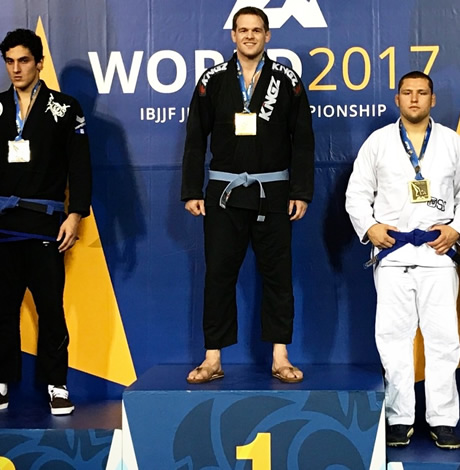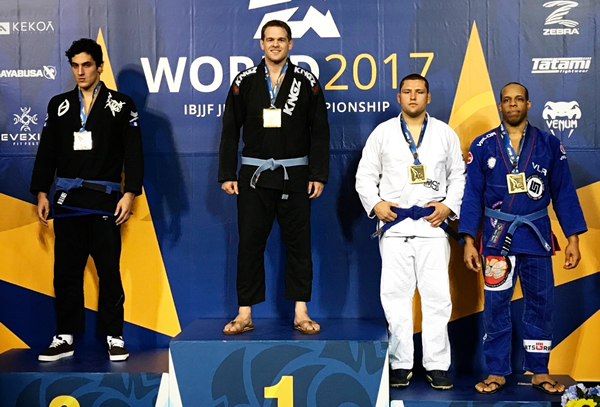Sports
Hudson Taylor returns to competitive sports
Champion wrestler starts over in Brazilian jiu jitsu


After a successful college wrestling career, Hudson Taylor, center, started over in Brazilian jiu jitsu. (Photo courtesy Taylor)
When Hudson Taylor appeared as the guest editor of the Washington Blade Sports Issue in 2015, he was already in his fifth year of serving as executive director of Athlete Ally, which he co-founded along with his wife Lia. Their mission is to end homophobia and transphobia in sports by providing public awareness campaigns, educational programming and tools and resources to foster inclusive sports communities.
At the same time, he was volunteering as an assistant wrestling coach at Columbia University. The coaching position allowed him to keep in touch with the sport that he loves, stay in shape and remain involved in the culture of sports.
His duties at Athlete Ally escalated to a point that required his attention on a full-time basis and he left his life as a wrestler behind to focus on the mission of his nonprofit.
“Wrestling had been a daily part of my life since age 6. When it ended, it was a struggle for me,” says Taylor. “The only way I knew how to stay in shape was through wrestling.”
Hudson Taylor was born in Pennington, N.J., and started wrestling at age 6. By age 10, he was committed to the sport and would go on to win nationals the following year along with maintaining top five national rankings in his weight class through eighth grade.
He next left his family home for prep school and boarded at Blair Academy for four years where he lived the life of a student-athlete. Taylor’s tenure at the school was during a wrestling dynasty that won 31 consecutive National Prep Titles from 1981 to 2012.
“One unique thing about Blair is that you are not divided across other sports. The wrestling team is committed to training year around,” Taylor says. “Outside of wrestling season, my fall sport was weightlifting and my spring sport was also weightlifting.”
Taylor was heavily recruited by colleges and could have gone anywhere. Northwestern University was his first choice, but he ultimately chose University of Maryland because its facilities were new and the theater department was the best match for what he wanted to study.
Not only was Taylor obsessed with competing, he had clear goals about other aspects of his life and they included Broadway, acting and performing. He entered the University of Maryland as a theater major with a music minor in vocal performance.
While competing at Maryland, Taylor was named the Atlantic Coastal Conference Wrestler of the Year in both 2007-08 and 2009-10, after winning the 197-pound title at the conference tournament. In his other two seasons, 2007 and 2009, Taylor finished second in his weight at the ACC’s.
On the national level, he finished third in the country in 2008 and 2009, and fourth as a senior in 2010. He is tied for fifth in career pins in the all-time NCAA record books with 87. At Maryland, he holds the school record for career pins (87), career wins (165) and pins in a single-season (24).
The time commitment proved difficult juggling sports and theater and his college major evolved into interactive performance art. It was the intermingling of sports and theater that would define his life path post-college.
To stand in solidarity with the LGBT community as a straight ally, Taylor wore an LGBT equality sticker from the Human Rights Campaign on his wrestling headgear. He received national media attention and the resulting experience would be his inspiration to launch Athlete Ally.
Fast forward to 2016 and Taylor is missing his sport. He begins stopping in at Edge Wrestling in Hoboken which offers adult wrestling, Brazilian jiu jitsu, mixed martial arts, muay thai and boxing. He would begin sparring with five-time World Jiu Jitsu champion Bernardo Faria, who is a black belt.
“Competitive jiu jitsu athletes take wrestling classes to help with their standing skills and we were having an exchange of knowledge,” says Taylor. “Not very many adults can give me a workout and I found myself getting tired; I was not in shape.”
A spark was ignited and Taylor began training in Brazilian jiu jitsu at the Marcelo Garcia Academy in NYC, which is two blocks from his Athlete Ally office. He says that wrestling and jiu jitsu are closely related but there is a huge wall between the two.
“When I first started going to the academy, I walked in as an elite level wrestler with an expectation,” Taylor says. “I ended up getting beat by people with nowhere near the time I have spent on the mat. It was both humbling and exciting to realize that I was a beginner again.”
After several months of going to classes three days a week, Taylor earned his blue belt in jiu jitsu in September, 2016.
“At that point I was like, ‘Heck, let’s compete. Put me in,’” Taylor says.
In his first tournament, the Pan IBJJF Jiu Jitsu No-Gi Championships in New York City, he won the gold medal in the super heavyweight division (215 to 220 pounds.) as a blue belt. He also entered the absolute division, which encompasses all the weight classes and won another gold medal.
“I have always been a student of my sport and obsessed with technique. Now that I am entering a new sport, I get to learn a whole new body of knowledge,” Taylor says. “I am in love with the new knowledge I am learning.”
Taylor next began teaching private lessons to jiu jitsu black belts to increase their wrestling skills. In April, he crossed over to grappling and won his division at the 2017 Grappling World Championship Team Trials in Las Vegas. He is now qualified to compete at the World Championships in Baku, Azerbaijan in October.
The journey continued this past June when he won his division at the 2017 World Jiu Jitsu IBJJF Championship in Long Beach at the blue belt level. In November, he is scheduled for the World No-Gi IBJJF Championship in San Francisco.
“I wish I had found all of this sooner because I want to compete against the best,” says Taylor, 30. “I am restricted by the belt system and it could take several years to advance beyond the blue belt.”
Just recently, Taylor began teaching his first classes at the Marcelo Garcia Academy, helping the athletes with their standing game. For now, he is enjoying his return to competitive sports and has no immediate plans to tie it into his work at Athlete Ally.
Coming up for Athlete Ally is a new campaign regarding the bidding process of the NCAA along with an athletic equality index on the policies of the NCAA Power 5 conferences.
When asked if he would ever consider showing support for the LGBT community on the jiu jitsu mat as he once did as a college wrestler, he doesn’t hesitate to reply.
“If I compete in a country that I feel needs athlete activism, you can bet there will be a patch on my uniform that supports equality,” Taylor says.
Sports
US wins Olympic gold medal in women’s hockey
Team captain Hilary Knight proposed to girlfriend on Wednesday

The U.S. women’s hockey team on Thursday won a gold medal at the Milan Cortina Winter Olympics.
Team USA defeated Canada 2-1 in overtime. The game took place a day after Team USA captain Hilary Knight proposed to her girlfriend, Brittany Bowe, an Olympic speed skater.
Cayla Barnes and Alex Carpenter — Knight’s teammates — are also LGBTQ. They are among the more than 40 openly LGBTQ athletes who are competing in the games.
The Olympics will end on Sunday.
Sports
Attitude! French ice dancers nail ‘Vogue’ routine
Cizeron and Fournier Beaudry strike a pose in memorable Olympics performance

Madonna’s presence is being felt at the Olympic Games in Italy.
Guillaume Cizeron and his rhythm ice dancing partner Laurence Fournier Beaudry of France performed a flawless skate to Madonna’s “Vogue” and “Rescue Me” on Monday.
The duo scored an impressive 90.18 for their effort, the best score of the night.
“We’ve been working hard the whole season to get over 90, so it was nice to see the score on the screen,” Fournier Beaudry told Olympics.com. “But first of all, just coming out off the ice, we were very happy about what we delivered and the pleasure we had out there. With the energy of the crowd, it was really amazing.”
Watch the routine on YouTube here.
Italy
Olympics Pride House ‘really important for the community’
Italy lags behind other European countries in terms of LGBTQ rights

The four Italian advocacy groups behind the Milan Cortina Winter Olympics’ Pride House hope to use the games to highlight the lack of LGBTQ rights in their country.
Arcigay, CIG Arcigay Milano, Milano Pride, and Pride Sport Milano organized the Pride House that is located in Milan’s MEET Digital Culture Center. The Washington Blade on Feb. 5 interviewed Pride House Project Manager Joseph Naklé.
Naklé in 2020 founded Peacox Basket Milano, Italy’s only LGBTQ basketball team. He also carried the Olympic torch through Milan shortly before he spoke with the Blade. (“Heated Rivalry” stars Hudson Williams and Connor Storrie last month participated in the torch relay in Feltre, a town in Italy’s Veneto region.)
Naklé said the promotion of LGBTQ rights in Italy is “actually our main objective.”
ILGA-Europe in its Rainbow Map 2025 notes same-sex couples lack full marriage rights in Italy, and the country’s hate crimes law does not include sexual orientation or gender identity. Italy does ban discrimination based on sexual orientation in employment, but the country’s nondiscrimination laws do not include gender identity.
ILGA-Europe has made the following recommendations “in order to improve the legal and policy situation of LGBTI people in Italy.”
• Marriage equality for same-sex couples
• Depathologization of trans identities
• Automatic co-parent recognition available for all couples
“We are not really known to be the most openly LGBT-friendly country,” Naklé told the Blade. “That’s why it (Pride House) was really important for the community.”
“We want to use the Olympic games — because there is a big media attention — and we want to use this media attention to raise the voice,” he added.

Naklé noted Pride House will host “talks and roundtables every night” during the games that will focus on a variety of topics that include transgender and nonbinary people in sports and AI. Another will focus on what Naklé described to the Blade as “the importance of political movements now to fight for our rights, especially in places such as Italy or the U.S. where we are going backwards, and not forwards.”
Seven LGBTQ Olympians — Italian swimmer Alex Di Giorgio, Canadian ice dancers Paul Poirier and Kaitlyn Weaver, Canadian figure skater Eric Radford, Spanish figure skater Javier Raya, Scottish ice dancer Lewis Gibson, and Irish field hockey and cricket player Nikki Symmons — are scheduled to participate in Pride House’s Out and Proud event on Feb. 14.
Pride House Los Angeles – West Hollywood representatives are expected to speak at Pride House on Feb. 21.
The event will include a screening of Mariano Furlani’s documentary about Pride House and LGBTQ inclusion in sports. The MiX International LGBTQ+ Film and Queer Culture Festival will screen later this year in Milan. Pride House Los Angeles – West Hollywood is also planning to show the film during the 2028 Summer Olympics.
Naklé also noted Pride House has launched an initiative that allows LGBTQ sports teams to partner with teams whose members are either migrants from African and Islamic countries or people with disabilities.
“The objective is to show that sports is the bridge between these communities,” he said.
Bisexual US skier wins gold
Naklé spoke with the Blade a day before the games opened. The Milan Cortina Winter Olympics will close on Feb. 22.
More than 40 openly LGBTQ athletes are competing in the games.
Breezy Johnson, an American alpine skier who identifies as bisexual, on Sunday won a gold medal in the women’s downhill. Amber Glenn, who identifies as bisexual and pansexual, on the same day helped the U.S. win a gold medal in team figure skating.
Glenn said she received threats on social media after she told reporters during a pre-Olympics press conference that LGBTQ Americans are having a “hard time” with the Trump-Vance administration in the White House. The Associated Press notes Glenn wore a Pride pin on her jacket during Sunday’s medal ceremony.
“I was disappointed because I’ve never had so many people wish me harm before, just for being me and speaking about being decent — human rights and decency,” said Glenn, according to the AP. “So that was really disappointing, and I do think it kind of lowered that excitement for this.”




















